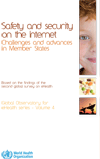
The Internet has moved beyond an educational and research tool that served as a social network for a few elite scientists and has been transformed into a commerce and health care juggernaut accessible to much of the planet. However, the accessibility of this resource has not been unencumbered by complication and challenge. Internet pharmacies demonstrated potential early on as a hub within a wider set of eHealth services, but has since been mired in doubts regarding transparency, fraud, product quality, and even its viability as an ethical business model. Even now, over a decade after the first Internet pharmacies, questions of legality and policy plague this venture. It is telling that among the total responding countries to this survey (114), most Member States (66%) remain uncommitted on this issue, unable to decide whether Internet pharmacies should be prohibited or allowed. And while those among World Bank categorized upper-middle and high-income countries are most likely to have addressed this issue, overall there is still more prohibition (19%) than permission (7%) of Internet pharmacy operations.
Download Safety and Security on the Internet: Challenges and Advances in Member States (.pdf, 2.989 KB).
Download from eHealthNews.eu Portal's mirror: Safety and Security on the Internet: Challenges and Advances in Member States (.pdf, 2.989 KB).
About Global Observatory for eHealth
The Observatory's mission is to improve health by providing Member States with strategic information and guidance on effective practices and standards in eHealth.
Its objectives are to:
- provide relevant, timely, and high-quality evidence and information to support national governments and international bodies in improving policy, practice, and management of eHealth;
- increase awareness and commitment of governments and the private sector to invest in, promote, and advance eHealth;
- generate knowledge that will significantly contribute to the improvement of health through the use of ICT; and
- disseminate research findings through publications on key eHealth research topics as a reference for governments and policy-makers.